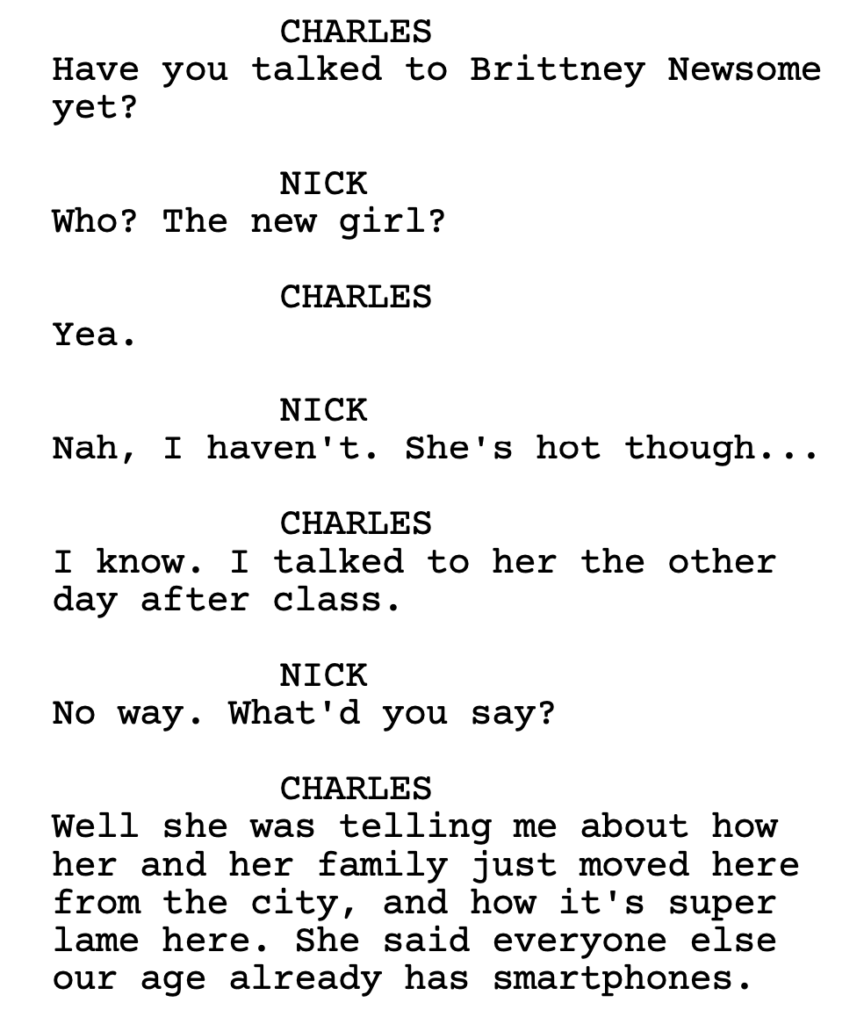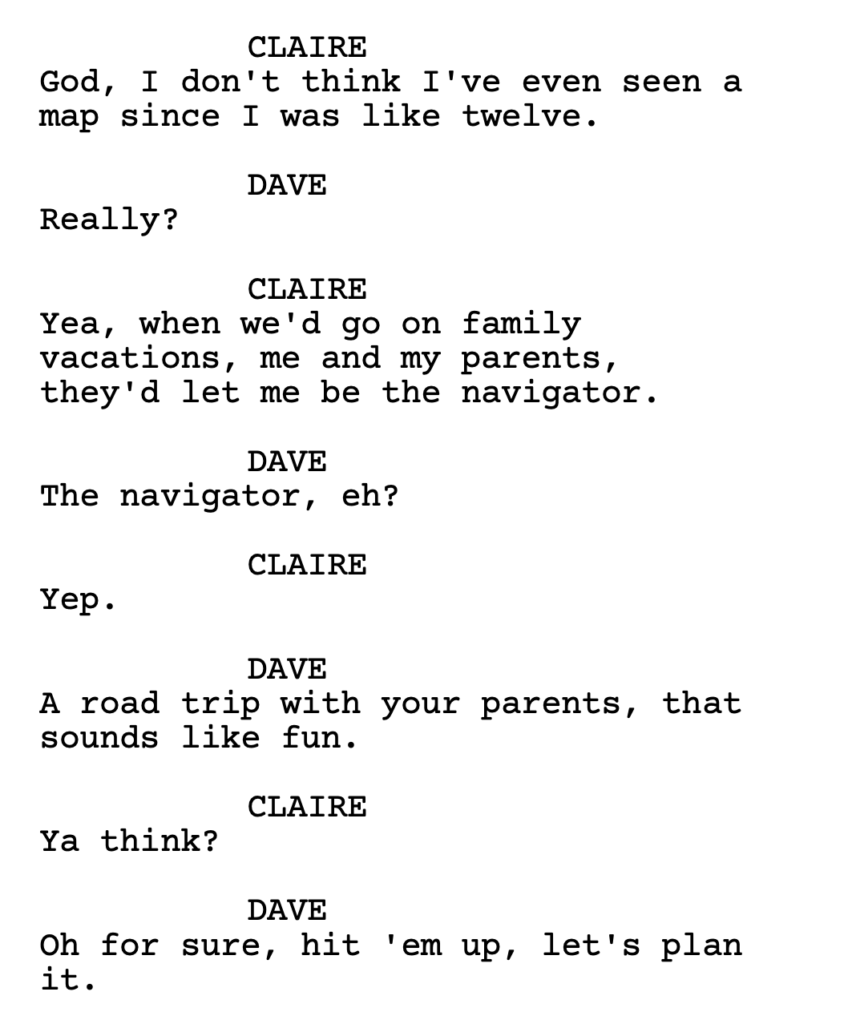August Logline Showdown deadline is THIS THURSDAY! Details below on how to enter!
Genre: 1 Hour Drama Pilot
Logline: In a small town located within the ‘Quiet Zone’ – an area of the country where cell service, WiFi and other transmissions are banned due to a secretive government research facility – an ambitious journalist investigates a string of missing persons cases and finds herself unraveling a larger conspiracy as she begins to expose the dark secrets within the zone.
About: Today we’re looking at the third-place finisher for Pilot Logline Showdown.
Writer: Sam Van Meter
Details: 55 pages
 Portman for Amy?
Portman for Amy?
I’m also using today’s review to remind you that we have the August Logline Showdown happening this Friday. Deadline is Thursday night. For Logline Showdowns, you send me a logline for a script. I then pick the best five loglines and they compete on the site with you guys voting. Whoever wins gets a script review the following week.
What: August Logline Showdown
Enter: Feature Screenplay Loglines Only
Deadline: Thursday, August 24th, 10:00 PM Pacific Time
Where: carsonreeves3@gmail.com
Okay, onto today’s review.
Some of you noted that “Quiet Zone” was the most “TV” pitch of the TV Logline Showdown. I agree. I liked the high concept aspect of the pitch. Now it’s time to see if the writer delivered.
Our story starts out in a forest, where we see the body of a young dead woman. We then meet 12 year olds Nick and Charles, who are playing around in that same forest. They hear some scary noises and see a dark shadow so they run as fast as they can. Nick makes it but it doesn’t look like Charles does.
Cut to our heroine, Amy, in her Chicago apartment. After orgasming, she tells her hookup buddy that she’s uninterested in returning the favor. She tells him that she’ll be gone for a while. She’s going to go check out this town called Blue Bank in West Virginia. She wants to write a story on a nearby research facility and, also, the fact that there’s no internet in the area.
Cut to Claire and Dave, a young married couple who are trying to escape to Blue Bank because Claire keeps getting headaches due to all the wireless and electro waves in the air. Apparently, some people head to Blue Bank to escape this, since Blue Bank doesn’t have any of these things.
We then meet the local sheriff of Blue Bank, Kevin. Kevin visits Suzy Walters to see how she’s doing. Suzy’s daughter has been missing for a while now and she’s falling apart. Suzy isn’t the only one dealing with this issue. There are several other people who have gone missing in town.
Amy finally arrives in town and meets Claire and Dave. She expresses interest in this mysterious research facility and starts driving around town. She eventually runs into Nick, from the opening scene, as he’s running out of the forest. Cut to black. End of episode 1.
When it comes to TV, more so than film, the dialogue has to be good. Remember that movies are more plot-driven. Because they’re plot-driven, a lot of the dialogue will deal with exposition. The characters will have to keep updating the audience on what they’re trying to do and what comes next.
TV is less plot-driven. Even the most plot-driven shows are less involved with plot than a movie. Instead, TV is about character. And because it’s about character, most scenes will highlight the characters conversing with each other.
This is why dialogue is so important in TV. It’s more of an expression of the characters as opposed to a vehicle to convey plot.
Quiet Zone had a lot of dialogue that didn’t meet the standard required for a show that gets on the air. It started with the two boys playing in the forest. These boys are 12 years old. Yet they spoke like they were 15 year old girls. Here’s a brief excerpt from their exchange.

So, already, my confidence is dipping.
Not long after that, we get this conversation between a married couple, Dave and Claire, where the dialogue wasn’t doing anything other than existing. There was no life to it. And if there’s no life to your dialogue, there’s no life to the characters speaking that dialogue. Because dialogue is the extension of each person’s personality.

After I finished reading “Quiet Zone,” I sat with my thoughts for a good 30 minutes, trying to figure out why the pilot didn’t resonate with me. I knew that something wasn’t working but I wasn’t sure what it was. So I did a quick second read-through and that’s when the problem hit me: everything about the story was too casual.
It started with Amy. I’m assuming Amy is our main character but it’s hard to tell. In any movie or show, you want there to be a major force pushing your characters forward.
Yet here we have Amy, a journalist, who just seems to have nothing better to do than head to Blue Bank, Virginia. Here she is telling her sorta-boyfriend where she’s going. “Just doin’ some research on the next piece I’m writing.” “What is it?” “It’s on this town in West Virginia. Blue Bank, West Virginia.” “Oh. What’s exciting about a small town in West Virginia?” “It’s just a potential story I’m working on. I’m gonna head down there soon.”
Does that sound like a major force pushing a character forward? Amy seems almost bored by the idea of going to this place. If she’s bored, how do you think we feel?
And it isn’t like you don’t have ways to create that force here. There’s this mysterious research facility. There are multiple missing people in Blue Bank. I would’ve loved a scene with her at the Tribune pitching this story to her reluctant boss. “There’s this really sketchy research facility I’ve been doing research on for the past three months. People keep going missing there. I think there’s a connection.” Let’s see some fire! Let’s see a REASON why she goes to this place other than mild curiosity, which is how it’s presented now.
As an extension of that, every other storyline is too casual. You have a unique premise here. You have this town that isn’t connected to the internet. It’s a dead spot. It’s like living in 1985. But there’s none of that on the page. In fact, if I hadn’t read the logline before reading the pilot, I wouldn’t have known about the concept! That’s how casually it’s dealt with. Outside of one person saying they’ve come here because they get headaches, this could’ve been any town in America.
Why aren’t we exploring the promise of that premise more? Why aren’t we focusing more on what’s DIFFERENT about this universe than what’s the same? It would be like writing a Jurassic Park pilot and there be one brief mention of a small dinosaur out by the beach.
Particularly, your featured scenes need to highlight what’s unique about your concept. The opening scene has two kids running from someone in a forest. That could literally happen in any script. Why aren’t we looking to find scenes that could only happen in *this* script?
Overall, the pilot seemed like it was written too fast. Like Sam didn’t sit down and figure out what’s unique about his world. Figure out ways to create depth and originality within this universe. There’s even a flashback scene with Amy when she was a kid. In it, she’s in a car with her parents at night and the car crashes, presumably killing both parents.
If I see a car crash backstory, that’s it for me. From that point on, I’ve given up on the script. Why? Because I read a million car crash backstories. It’s lazy. And when you’re doing the thing that everybody else does, it tells me you’re not trying to be unique. You’re not attempting to differentiate your script.
This script needed to be obsessive with its concept. As it stands, it’s only mildly curious about it. That mild curiosity bleeds into our reaction. Since the writer is only mildly curious, we’re only mildly curious. For scripts to resonate, the reader needs to be obsessed with what’s going on.
[ ] What the hell did I just read?
[x] wasn’t for me
[ ] worth the read
[ ] impressive
[ ] genius
What I learned: If characters only seem mildly invested in what’s going on, the reader is only going to be mildly invested in what’s going on.

